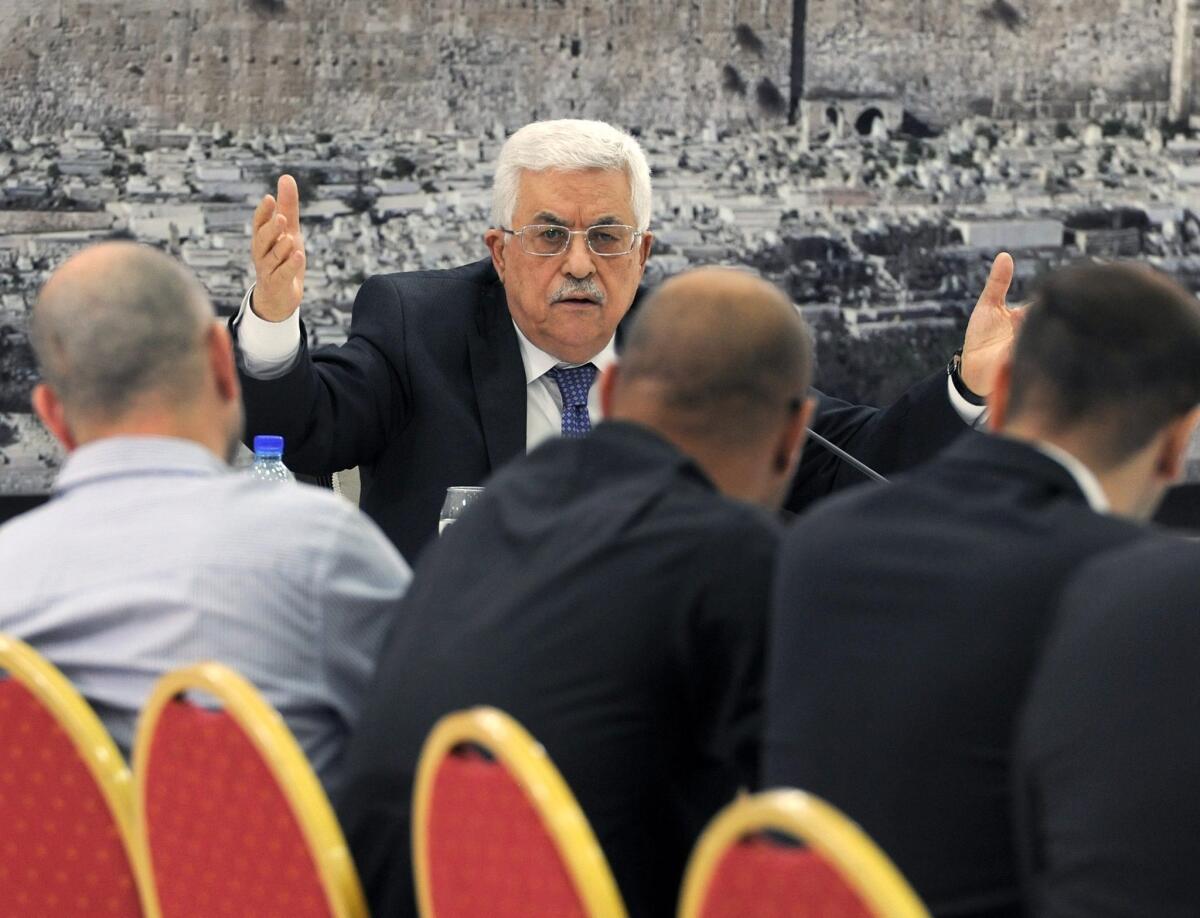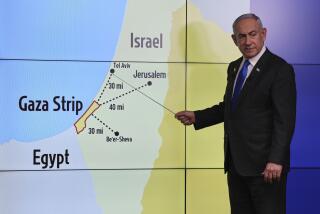Israelis, Palestinians struggle for way forward as deadline nears

JERUSALEM -- With Israeli-Palestinian peace negotiations still deadlocked a week before their current round expires, negotiating teams met Tuesday with U.S. envoy Martin Indyk in Jerusalem to discuss extending the troubled talks.
Nine months of meetings between Israeli and Palestinian teams have yielded little agreement, and both sides’ tough positions have stymied the effort to secure a framework for working toward a two-state solution to the conflict.
The U.S.-mediated negotiations broke down last month over Israel’s delay in releasing a group of Palestinian prisoners as promised. That was followed by a Palestinian request to the United Nations to join more than a dozen international treaties, a move opposed by Israel.
Both sides have indicated they wish to continue the talks but have terms. The Palestinians this month drew up a list of conditions, including Israeli recognition of Palestinian borders along lines that predate the 1967 Middle East War and of East Jerusalem as the Palestinians’ capital. Israel rejected the conditions, as it has long done, and has so far avoided concrete discussion of borders.
Talks broke down, though Israel reportedly was considering a deal that would free the promised prisoners and an additional 400 Palestinians being held and partially freeze settlement construction. The release of Jonathan Pollard, who was convicted in 1987 of spying on the U.S. for Israel and who remains imprisoned in North Carolina, reportedly also was on the table.
The last-stretch efforts came amid recent reports that Palestinian Authority President Mahmoud Abbas was considering dissolving the authority, potentially turning the tables 20 years back and leaving responsibility for millions of West Bank Palestinians to Israel.
On Monday, State Department spokeswoman Jen Psaki said such an extreme step would have “serious implications” for American relations with the Palestinians, including future assistance.
In a meeting with Israeli journalists in the West Bank city of Ramallah on Tuesday, Abbas said talks could continue beyond April 29 if Israel meant to be “serious regarding the political negotiations and the two-state solution.”
He outlined the Palestinians’ basic conditions for continuing the talks. First, Israel would have to release the last group of Palestinian prisoners it promised to release when talks began, including a group of Israeli citizens.
Several members of Israeli Prime Minister Benjamin Netanyahu’s ruling coalition have threatened to quit their posts and even the government if Israel agrees to Abbas’ demand that Israel free Arab Israeli citizens jailed for violent crimes against Israelis.
The next condition, Abbas said, is that the talks focus immediately and intensively on determining the border between Israel and a future Palestinian state. During this intensive three-month period, Palestinians will demand a complete freeze on all settlement construction.
Abbas stressed Palestinians’ desire for two states living side by side in peace and security. “We want to end the painful chapter in the history of our two peoples and turn a new leaf for our children,” he told the Israelis.
However, Abbas said, if negotiations fail, the Palestinians will tell Israel that it has “emptied the Palestinian Authority of all content; here it is, take it.”
In that case, Palestinians will peacefully hand over to Israel all civilian and security authority throughout the West Bank and the Israelis will resume full responsibility for all services, he said.
Netanyahu maintains it is the Palestinians who must decide where they’re going.
“They should decide whether they want to disband or have unity, and when they want peace, they should let us know, because we want a genuine peace,” he said Monday. He was referring to unity talks between the rival Palestinian political movements Fatah and Hamas set to start in the Gaza Strip.
The State Department’s Psaki said it was up to both parties to decide the way forward.
“As long as they want to find a way to continue the negotiations, we’re willing to help them do that,” she said.
Psaki said Secretary of State John F. Kerry remained willing to travel to the region to help, though she said she had no plans to announce.
Sobelman is a special correspondent.
More to Read
Sign up for Essential California
The most important California stories and recommendations in your inbox every morning.
You may occasionally receive promotional content from the Los Angeles Times.










